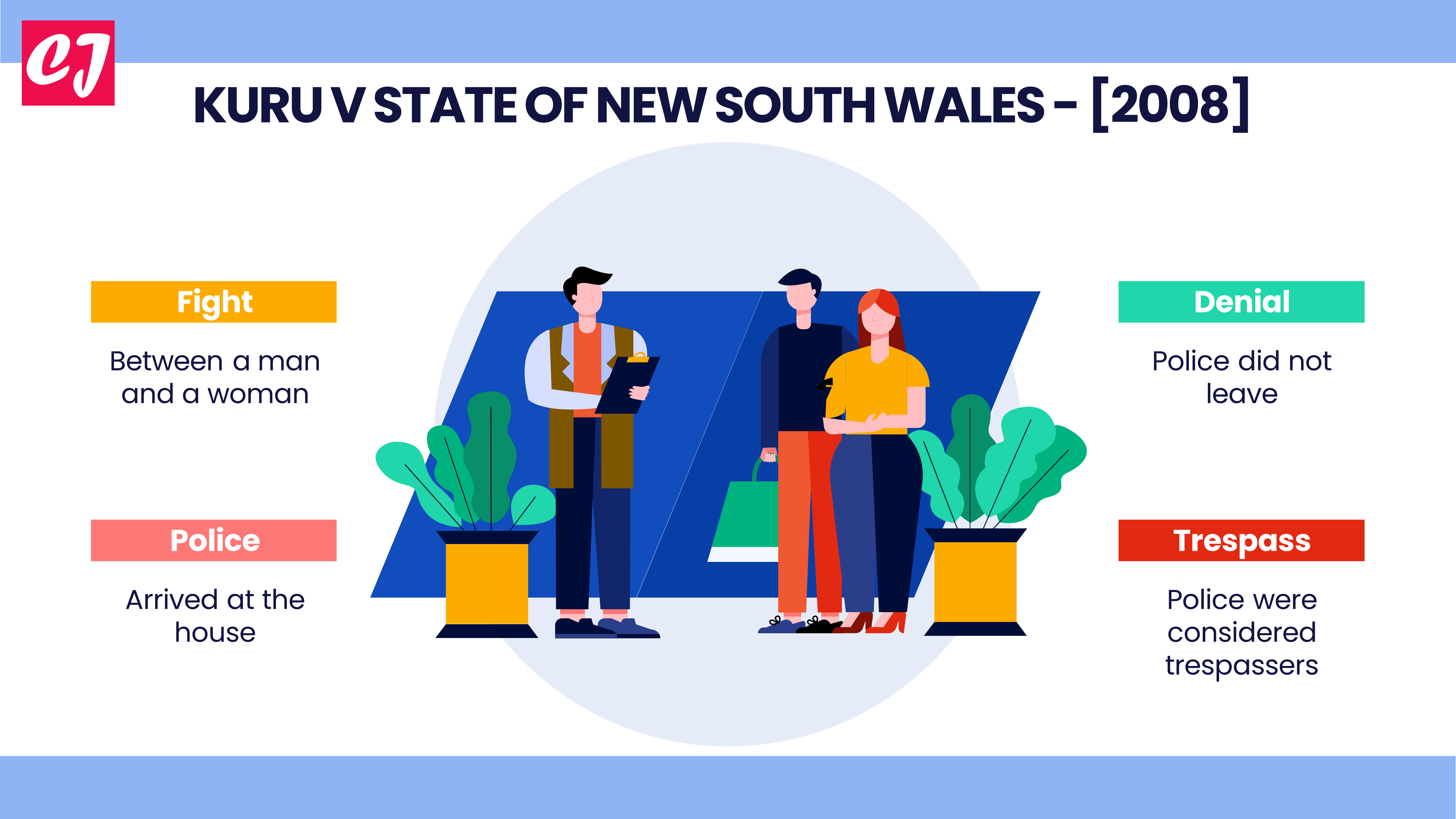
Kuru v NSW [2008]: A Case Summary
Kuru v NSW [2008] is a tort law case on issues of trespass and false imprisonment.
Case name & citation: Kuru v State of New South Wales [2008] HCA 26; (2008) 236 CLR 1
- The concerned Court: High Court of Australia
- Decided on: 12 June 2008
- The bench of judges: Gleeson CJ, Gummow, Kirby, Hayne and Heydon JJ
- Area of law: Trespass to land; False imprisonment; Domestic violence; Trespass to person
Quick Outline
| 1. On getting a report, police entered a house to check if there was violence. 2. Upon arrival, there were no ongoing arguments. 3. The house owner asked the police to leave, but the police refused. A physical struggle ensued. 4. Held: The police no longer had a legal basis to remain on the property. It was trespassing from the time it was asked to leave. |
Facts of Kuru v State of NSW
The incident occurred on 16 June 2001 when six police officers went to Mr. Kuru’s house after receiving a report that a man and a woman were fighting. By the time police arrived, the argument between Kuru and his fiancée had ended and she had left with Kuru’s sister.
When the police entered, two of Kuru’s friends were in the living room and he was in the shower. When he came out, he allowed the police to look around. He said that his fiancée had already left and gave his sister’s telephone number.
Then he asked the police to leave. But the police refused to leave after repeated demands.
Mr. Kuru jumped on the kitchen bench to gain their attention and later moved towards the police with his arms outstretched, making physical contact with an officer.
A physical struggle ensued and Kuru was punched, sprayed with capsicum spray, and handcuffed. He was then taken into custody.
Legal proceedings
Mr. Kuru brought action against the State of NSW in the NSW District Court and claimed damages for trespass to his person and property and false imprisonment. He was awarded damages of $418,265.
The State of NSW appealed to the NSW Court of Appeal. The appeal was allowed. The police were not considered trespassers when Mr. Kuru first made contact with one officer. The police had a statutory right to stay there as they were investigating whether domestic violence was committed.
Kuru appealed to the High Court of Australia.
Judgment of the High Court in Kuru v State of NSW
The High Court allowed the appeal with a 4:1 majority. The main question was whether the police were trespassing at the time of the physical encounter with Mr. Kuru.
The police did not have statutory or common law powers to stay at Kuru’s house. As per Section 357F of the Crimes Act, police were entitled to enter or remain even if the occupier of the house objected provided that the police were invited by a domestic violence victim.
However, in this case, the police were not invited by a domestic violence victim.
In addition, Section 357H provided that police who entered a house by invitation or with a warrant could remain there only as long as needed to investigate whether an offense had been committed, to render aid to an injured person, to make an arrest, to prevent further offenses, etc.
The police, in this case, had already inspected the house and did not need to stay to speak to the fiancée.
After Kuru had asked them to leave, the police were not entitled by Sections 357F or 357H to remain at the house.
Also, the common law recognized that trespass on land could be justified in emergencies, but in this case, there was no danger to life or property, and no emergency situation.
Mr. Kuru’s refusal or withdrawal of permission for the police to enter or remain on the property could not be overridden in this case.
Conclusion
The High Court held that the police officers refused to leave Kuru’s house after he asked them to do so and engaged in a physical struggle with him. They had committed a trespass to his person as well as his property.
References:
High Court of Australia. (n.d.). https://www.hcourt.gov.au/assets/publications/judgment-summaries/2008/hca26-2008-06-12.pdf
Nedim, U. (2020, May 6). Can police enter and leave my property as they please?. Sydney Criminal Lawyers. https://www.sydneycriminallawyers.com.au/blog/can-police-enter-and-leave-my-property-as-they-please/
You might also like:
More from tort law:

